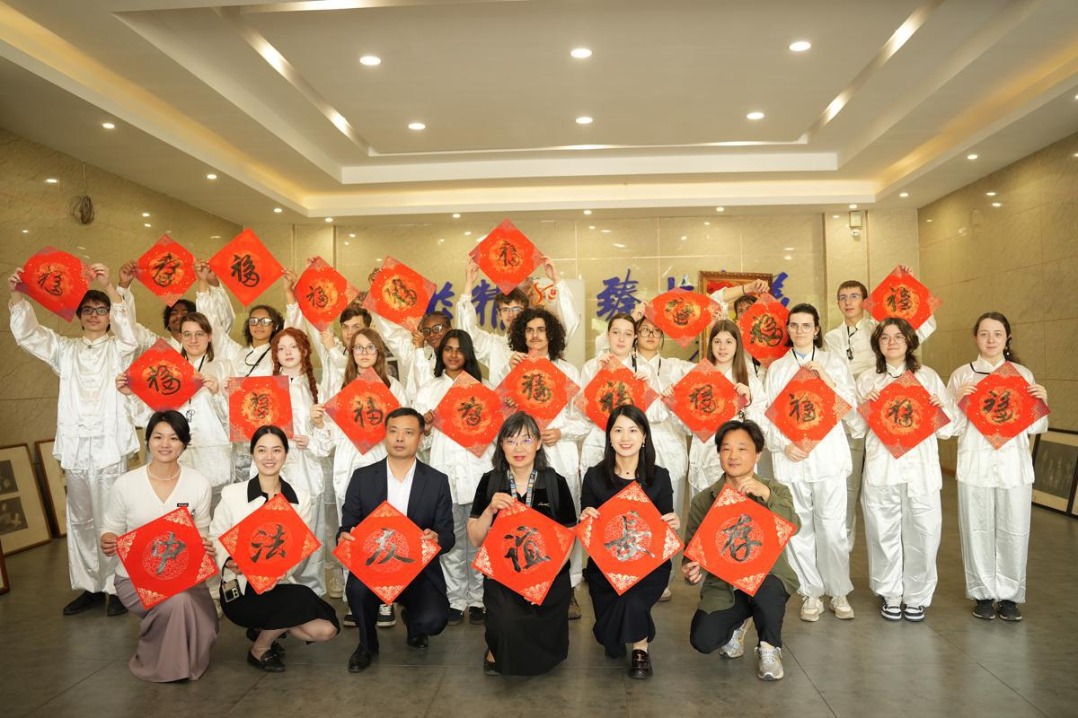Innovation seen as crucial in nation's modernization


China's blueprint to become a self-reliant scientific power is about bolstering the nation's ability to solve key strategic issues through its own efforts and to achieve quality, sustainable development through innovation and ingenuity, experts and officials said.
The communique of the Fifth Plenary Session of the 19th Central Committee of the Communist Party of China, which was released last month, stated that China will uphold the central role that innovation plays in modernizing the country and turn self-reliance in science and technology into a strategic pillar for national development.
More details were disclosed in the proposals for the country's 14th Five-Year Plan (2021-25) for National Economic and Social Development and the Long-Range Objectives Through the Year 2035, which were adopted at the plenary session.
The proposals state that China will launch major research projects in artificial intelligence, quantum information technology, integrated circuits, life science and health, brain science, aerospace technology, and deep earth and ocean exploration, as well as other cutting-edge fields.
The nation will also enhance basic and interdisciplinary research, launch new science initiatives, enhance international cooperation, and encourage the sharing and improved allocation of resources between research institutions, universities and companies.
It will reorganize its State key laboratories, create new comprehensive national science centers, and support Beijing, Shanghai and the Guangdong-Hong Kong-Macao Greater Bay Area becoming global science and technology innovation centers.
Bai Chunli, president of the Chinese Academy of Sciences, said in a commentary in People's Daily that the strong emphasis of science and technology in the national agenda signals a sincere and urgent need to use innovation to meet the nation's strategic demands.
For China, the next five years is a "key transition period" between completing the historic goal of building a moderately prosperous society in all respects, which is set to be completed this year, and the beginning of the grand undertaking of becoming a great modern socialist country by 2049, Bai said.
"At this critical juncture, more than ever before, our socioeconomic development and the improvement of people's livelihoods rely on finding solutions from science and technology," Bai said.
"The proposals represent a clarion call for scientists to mobilize and work to turn the nation into a scientific and technological powerhouse," he said.
As a result, the academy will enhance basic research to create innovations and solutions to meet the nation's needs, train more quality talents, uphold international cooperation, and optimize China's research resources and evaluation mechanisms, he said.
Major research projects
Last month, the Ministry of Science and Technology divided the science-related missions highlighted in the proposals for the 14th Five-Year Plan into 15 major research projects, and assigned them to 20 universities and institutions.
These projects examine a wide range of subjects, including how to fund basic research, the commercialization of scientific output, talent training, the social impact of new technologies, international cooperation, and how to encourage private companies to be more innovative.
Wang Zhigang, minister of science and technology, said at a news briefing last month that China's scientific capability is witnessing "quantitative to qualitative transformation".
China's research and development spending reached 2.21 trillion yuan ($329.2 billion) last year, a significant increase from 1.42 trillion yuan in 2015, according to the Ministry of Science and Technology.
Of the total R&D budget last year, 133.6 billion yuan was used for basic research, almost double that of 2015. Many frontier scientific fields, including quantum communication, materials science, computer science, biology and space and deep-sea exploration, have witnessed numerous breakthroughs by Chinese scientists, it said.
However, the nation is still lacking in support for basic research and the ability to make original breakthroughs. The shortage of high quality talents, cumbersome administrative management of scientific projects, as well as upholding research ethics and academic integrity are issues that also need improving.
"We need to seize the important opportunities presented by the new wave of technological revolution and industrial reforms," Wang said, adding the nation's scientific community should set its sights on tackling the world's scientific frontiers, promoting high-quality economic growth, meeting the nation's major needs and safeguarding the lives and health of the people.
Huai Jinpeng, executive vice-president of the China Association for Science and Technology, said during the Second World Science and Technology Development Forum in early November that the proposals for the 14th Five-Year Plan offered bright prospects for China.
"China will enter a new developmental phase and will use new ideas to create new opportunities that can further facilitate a more open dual circulation," he said.
Dual circulation is a strategy aimed at fortifying China's economic resilience in the face of global uncertainties by taking the domestic market as the mainstay while letting the domestic and international markets boost each other.
Shared future for mankind
"Science and technology will provide strategic support for modernization, and with reform and opening-up as a fundamental driving force, China will facilitate the development of human civilization and the building of a community with a shared future for mankind," Huai said.
Li Xiaohong, president of the Chinese Academy of Engineering, said at the forum that in a tumultuous world, mutual trust, cooperation and development are greatly needed to tackle shared challenges such as climate change, food security, energy shortages and public health emergencies.
"In the face of global issues that threaten humanity's survival and development, no country can stand aloof, and we are all in this together," he said. In the future, China will be more open, more collaborative, and more capable of contributing to the global effort of tackling these concerns.
Roger Kornberg, chairman of the World Laureates Association and the Nobel chemistry laureate in 2006, said that China has devoted a large portion of the blueprint for its 14th Five-Year Plan to science and technology, with an emphasis on international cooperation.
"My colleagues, friends and I feel gratified about this, and we think it is the sincere aspiration of China to enhance cooperation with the world scientific community," he said, adding that more foreign scientists may come to China to conduct basic research and turn research into applications.
"Our concern is basic science, and we share the same spirt-making efforts on the common destiny and well-being of mankind," he said.
Sun Mingzeng, a researcher of political theory at Tianjin Academy of Social Sciences, said the proposals adopted at the Fifth Plenary Session have elevated self-reliance in science and technology to historical heights.
"Core technologies cannot be bought or traded, they must be created by ourselves," he wrote in a commentary for Guangming Daily, adding that some technologies have even become China's major bottlenecks and hidden security risks.
"Without mastering core technologies is like building a house on someone else's property. Only by increasing our ability for indigenous innovation can we ensure national security on the fundamental level."
- Public discontent mounts in Taiwan over DPP's policy persecuting mainland spouses
- Young birders flock to Beijing's Central Axis for glimpse of urban wings
- Rice gene map to enable breeding of improved varieties
- China dispatches health team to quake-hit Myanmar
- China boosts vaccination accessibility at grassroots
- John Lee: HKSAR govt to press ahead with 15th National Games preparation




































